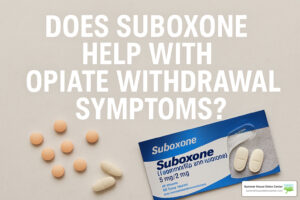
Recognizing and Managing Opiate Withdrawal Symptoms Safely
Recognize opiate withdrawal symptoms. Learn safe management, detox options, and paths to lasting recovery.

February 3, 2020
Opiates are highly addictive drugs that can lead to withdrawal if you’ve been using them regularly in high amounts or for an extended period. If you experience one or more uncomfortable or debilitating symptoms after cutting back on opiates, chances are you’ve become physically dependent on these drugs and need help quitting in the safest manner possible to avoid complications. Here’s everything you need to know about opiate withdrawal, and how opiate detox can help.
Opiate withdrawal syndrome is the term used to describe the symptoms you may experience when abruptly cutting back or completely stopping opiate use. Opiate withdrawal syndrome usually only affects those who have become physically dependent on these drugs. When you use opiates regularly, your body adjusts to the presence of these drugs in your body and comes to rely on them for normal functioning. When you suddenly quit, your body goes through withdrawal as its way of attempting to recover and find balance after having been exposed to drugs long-term.
Opiate withdrawal is different for everyone, and not all users will experience the same set of symptoms when quitting. Factors that can affect the severity of withdrawal include overall health status, existing health conditions, metabolism, the length of time the person used opiates, and the quantity used, among other factors.
Early symptoms of opiate withdrawal may include:
Late symptoms of opiate withdrawal may include:
Many people compare opiate withdrawal to having a bad case of the flu and cite insomnia and drug cravings as some of the most difficult symptoms to cope with. Without the proper support, supervision, and treatment, many who try withdrawing from opiates end up relapsing in an effort to relieve their symptoms, and often face a higher risk for overdose as a result.
Opiate withdrawal can last anywhere between 4 and 20 days or longer, based on the circumstances surrounding the person’s health, medical history, and history with substance use. Those who use short-acting opiates like heroin may start to experience withdrawal symptoms within 8 to 24 hours after the last dose, while those who use long-acting opiates like methadone usually start to experience symptoms within 12 to 48 hours after the last dose. Withdrawal from short-acting opiates may last 4 to 10 days, while withdrawal from long-acting drugs may last 10 to 20 days.
An estimated 90% of recovering opiate users will experience post-acute withdrawal syndrome (PAWS). Also known as protracted withdrawal syndrome or prolonged withdrawal syndrome, PAWS refers to the symptoms and impairments that can persist for weeks or months after stopping opiates. PAWS also affects those recovering from dependence on alcohol or benzodiazepines and is thought to be caused by a range of changes that occur in the brain as a result of substance abuse.
PAWS symptoms may include:
Anyone who has been using opiates regularly for more than a few weeks can experience withdrawal. Dependence and withdrawal may be affecting your friends, relatives, neighbors, coworkers, and many other people you interact with daily. This includes people who were prescribed opiates by their doctors to manage pain such as that caused by surgery or injury, as well as those who may have used these drugs for recreational purposes. Even people without a valid prescription who were given opiates by friends and relatives can become physically dependent and suffer withdrawal symptoms when quitting.
In 2015, it was reported that 91.8 million people in the U.S. used prescription opiates, with more than 11 million of that population reporting having misused their medications. Furthermore, 400,000 people reported past-month heroin use between 2015 and 2016, with an estimated 80% of new heroin users reporting that the first opiate they ever used was prescribed to them. Should these individuals try quitting opiates abruptly, the majority will likely experience withdrawal due to the changes made to their brains and bodies induced by drug use.
Opiate withdrawal symptoms are usually not life-threatening on their own. However, some symptoms can lead to complications in the absence of close monitoring, supervision, and professional medical treatment.
The most serious complications associated with opiate withdrawal are relapse and overdose. Many times, symptoms can become so unbearable to the point people resume drug use just to find relief. However, quitting opiates for just a few days can significantly reduce one’s tolerance level. People who relapse usually go back to using the same dose they were using before quitting, which is often more than their bodies can handle. Unfortunately, these users are often at higher risk for overdose and death.
Other complications associated with opiate withdrawal are dehydration and malnutrition. Loss of fluids through sweating, vomiting, and diarrhea increases the risk for dehydration, while symptoms like nausea, bone aches, and abdominal cramping can lead to loss of appetite to increase the risk for malnutrition and nutritional deficiency.
Of the more than 70,200 drug overdose deaths that occurred in 2017, an estimated 68% involved an opiate. If you or a loved one is going through opiate withdrawal, your safest option is to seek treatment from an opiate rehab center that offers opiate detox.
Opiate detox is a medical intervention that manages the physical symptoms of opiate withdrawal so people can safely overcome dependence while experiencing less pain and discomfort. It usually takes place in a residential or inpatient addiction treatment center, where medication is given to help with the side effects and symptoms. These medications, including methadone, buprenorphine, and Suboxone, can effectively reduce and/or eliminate all withdrawal symptoms including drug cravings and insomnia. Some patients have the option of staying on these medications long-term for months and years following their treatment programs so they can remain abstinent and avoid relapse.
Opiate detox may be combined with alternative therapies to accelerate and enhance the body’s healing and recovery process. Acupuncture, daily massage, yoga, and nutritional gourmet meals are examples of services and amenities available at some opiate rehab centers to help patients experience a fulfilling recovery.
Summer House Detox Center offers opiate detox in West Palm, Florida to help people safely withdraw from opiates while facing a reduced risk for complications. Summer House uses medications to help patients feel more comfortable during withdrawal and offers a wide range of quality, luxurious amenities to enhance the recovery experience.
If you are suffering from opiate dependence and need help, contact Summer House Detox Center today at 800-719-1090 to speak with a qualified addiction specialist. Or fill out our free insurance verification form to determine whether your treatment at Summer House is covered by your health plan. Visit us at 13550 Memorial Highway Miami, FL 33161.
Sources:

Recognize opiate withdrawal symptoms. Learn safe management, detox options, and paths to lasting recovery.

Does Suboxone help with opiate withdrawal symptoms? Get facts on how it provides relief & supports a safe detox at Summer House.

Learn does gabapentin help with opiate withdrawal symptoms, its benefits, risks, and usage tips before starting your detox journey.
For immediate assistance, please call our Admissions Specialists at 800-719-1090.
Speak With A Qualified Addiction Specialist 24/7